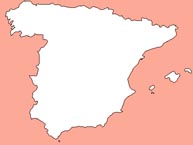Spain's tourism industry faces new challenges
 Madrid - For years, tourism had been one of the main engines of Spain's economy, but its role is being increasingly questioned.
Madrid - For years, tourism had been one of the main engines of Spain's economy, but its role is being increasingly questioned.
Not only has Europe's economic slowdown hit the tourism industry, with the number of foreign visitors plunging by nearly 16 per cent in February.
Spain's traditional tourism model based on the sea and sun is also facing increasing competition from cheaper destinations, and global warming poses far-reaching challenges for the tourism industry.
Until now, Spain has been the world's second-biggest tourist destination after France. The country of 45 million residents receives nearly 60 million foreign visitors annually. About 30 per cent of them come from Britain, Germany and France.
Tourism contributes more than 11 per cent of Spain's gross domestic product (GDP) and represents over two million jobs.
The economic crisis in Europe and the falling value of the British pound have hit the tourism industry.
The number of foreign tourists already dropped by 1.7 million in 2008, when empty beach chairs and restaurant tables could be seen at some tourist resorts in the summer.
The crisis also affects domestic tourism, which earns about half of the tourism income, after Spain slipped into a recession in the end of 2008.
Investments in tourism infrastructure such as hotels are slowing down, while tourism-related businesses are struggling to cut prices by as much as 20 per cent for the Easter season.
The crisis comes just as Spain is facing increasing competition from eastern Mediterranean destinations such as Turkey and Egypt.
The only long-term solution is for Spain to diversify its tourism, about 70 per cent of which is still based on the traditional formula of the sea and sun, experts say.
Beach tourism has contributed to the coast becoming crammed with hotels, holiday residences, other tourism-related urban infrastructure and pollution, which are now keeping visitors away.
Spain has increased its offer of cultural or rural tourism, with overnight stays in urban hotels going up by 6 per cent in 2007.
In the longer run, Spanish tourism will also be affected by global warming, which is expected to push temperatures upwards and reduce the size of beaches as sea level rises.
Warmer weather will extend the tourism season, which will cover practically the entire year in the Mediterranean area, according to a new study by the Company and Climate Foundation (FEC).
"Barcelona will be like Malaga, and Malaga like Marrakech," FEC director Elvira Carles said.
At the same time, however, droughts could put tourists off, unless measures are taken to ensure water supplies.
Spain is also expected to face competition from new tourism destinations in northern Europe, where many holidaymakers will get tans close to home instead of going down south.
The phenomenon has already been noticed on the Canary Islands, where Tenerife received slightly less tourists in 2007 as weather improved in Britain, the daily El Pais reported.
Global warming could also be fatal to Spanish ski resorts unless they seek alternatives, such as nature tourism, experts warn. (dpa)